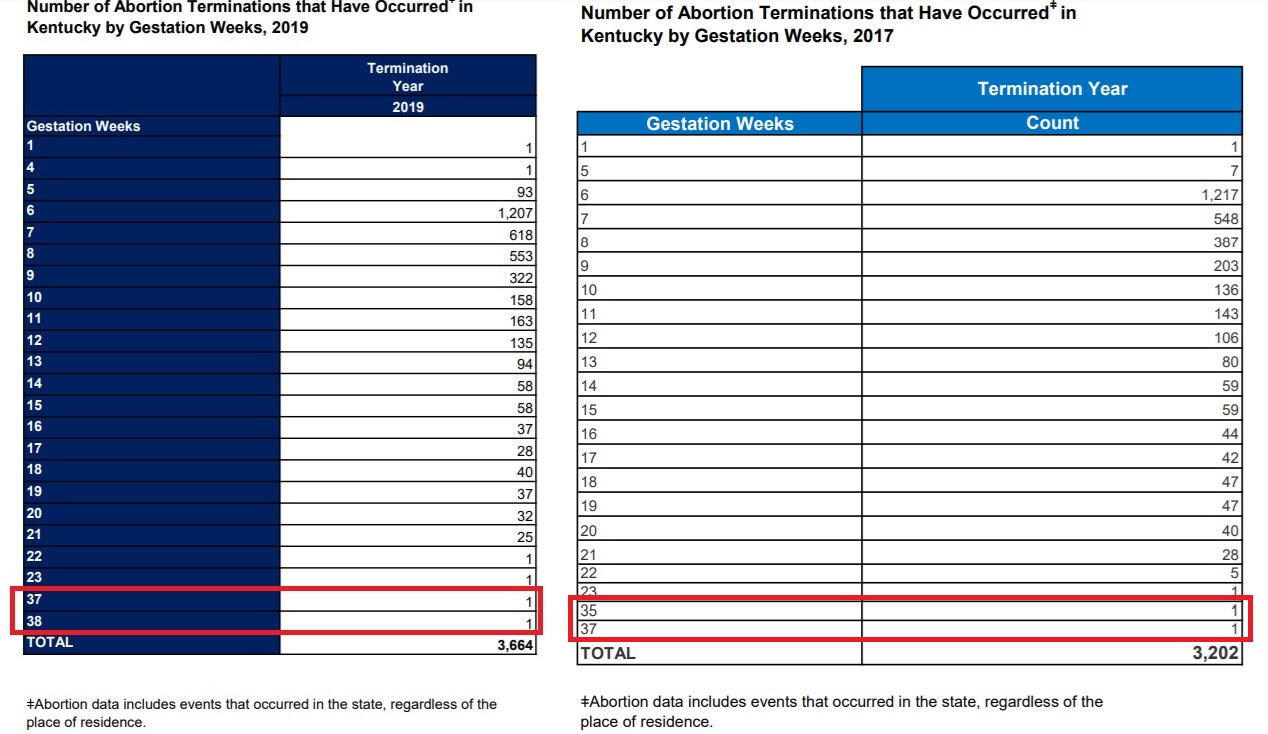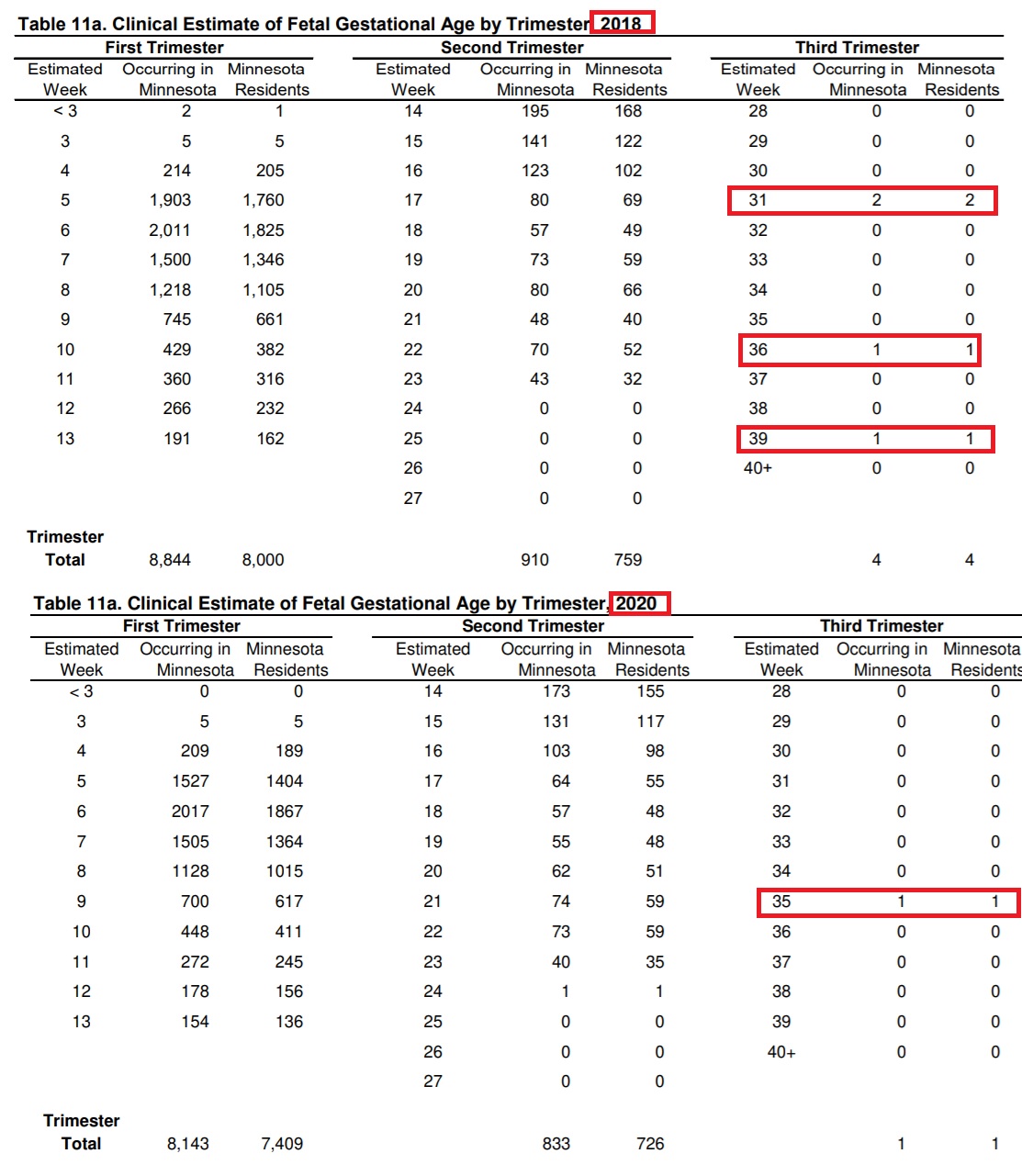The abortion industry and its friends in the media frequently claim pro-lifers who claim babies can be aborted up to birth are exaggerating. But data from various states is proving the pro-abortion narrative false.
Kentucky has indicated that, while a pregnancy lasts for about 40 weeks, the lives of two preborn babies were violently ended by abortion in the state at 37 and 38 weeks gestation in 2019 and two babies were killed by abortion at 35 and 37 weeks gestation in 2017.
Though Kentucky doesn’t specify where the abortions were committed, the reports listed four facilities as committing abortions in 2019: EMW Women’s Center, Norton Hospital, Norton Women’s and Children’s Hospital (NWCH), and the University of Louisville. All but NWCH were listed in 2017 as well.

KY abortion up to birth 35 to 37 weeks gestation Kentucky 2019 and 2017
For years, Michigan recorded multiple abortions committed at “over 28 weeks” but did not specify the gestational age beyond this. Two of these abortions were committed in 2020, one in 2019, one in 2018, three in 2017, eight in 2016, 21 in 2015, and 18 in 2014.
Tragically, Minnesota‘s 2020 abortion report also recorded one abortion committed at 35 weeks gestation. The same pattern appeared in the state in 2018, when the clinical estimated fetal ages of babies aborted (up to birth) were as follows: two at 31 weeks, one at 36 weeks and one at 39 weeks gestation.

Minnesota abortion up to birth 2020 and 2018 gestation above 31 weeks
A new case brought by Thomas E. Dobbs, State Health Officer of the Mississippi Department of Health, is being heard this fall before the United States Supreme Court. Dobbs v. Jackson Women’s Health Organization centers around a Mississippi law which prohibits abortions beginning after 15 weeks gestation.
Abortion at this point in pregnancy generally involves a dilation and evacuation, or D&E, abortion. This procedure comes with an increased risk of complications to the mother and is particularly gruesome, even by industry standards.
In the video below, former abortionist Dr. Anthony Levatino describes the procedure, which involves dismembering a preborn child’s arms and legs from her torso before crushing her skull. The procedure is so brutal that one abortionist claimed the term “butchers” might be accurately applied to abortionists, while others have admitted the procedure is violent:
In an amicus brief submitted in support of the State of Mississippi, the American Center for Law and Justice (ACLJ) was quick to note the cruelty of 15-week abortions and all late-term abortions, pointing out, “The Notion of a Constitutional right to late-term abortions is in grave tension with the eighth amendment” which “bars ‘cruel and unusual punishment.'”
“Abortion at and after 15 weeks typically employs extremely cruel and barbaric methods to slay the child in the womb,” the legal group stated. “What is done to babies in the womb in post-15 week abortions would violate the eighth amendment if done to convicted criminals.”
“Plainly, a state could not constitutionally employ ‘dismemberment abortion’ to execute prisoners, no matter how grievous the convict’s crimes might be. Yet the court below held that this Court’s precedents required it to immunize the same grotesque practice when perpetrated against innocent human children prior to birth,” ACLJ wrote, adding it would “violate animal cruelty laws if done to animals.”
“It is common practice and constitutional for states to ban animal cruelty, which would include killing an animal by pulling it to pieces. The law at issue defined ‘animal cruelty’ to include practices ‘in which a living animal is intentionally maimed, mutilated, tortured, wounded, or killed,'” the ACLJ wrote, citing the statute.
Roe v. Wade, the 1973 Supreme Court case that legalized abortion across the nation, said that states could not prohibit abortion up to the end of the second trimester or the 24th week of pregnancy, when some Justices determined a baby might survive outside the womb.
This so-called “viability rule” was arbitrary, and as Live Action News previously documented, was in conflict with citations made by pro-abortion organizations in amicus briefs filed in the case. The fact is that preborn children are viable in the womb, so long as they remain in their appropriate environment — a place of safety where they can be nourished and grow.
Roe’s companion case, Doe v. Bolton, cleared the way for states to permit abortion in all months of pregnancy for “health reasons.” Live Action News previously reported that “health” can mean “’physical, emotional, psychological, familial’…. These provisions — which are rarely mentioned by media outlets — provide broad leeway to perform abortions in practically every case….”
If the Court rules in favor of Mississippi in Dobbs v. Jackson Women’s Health Organization, more preborn babies at both “previable” and “viable” stages will be protected from this kind of barbarism.
“Like” Live Action News on Facebook for more pro-life news and commentary!







